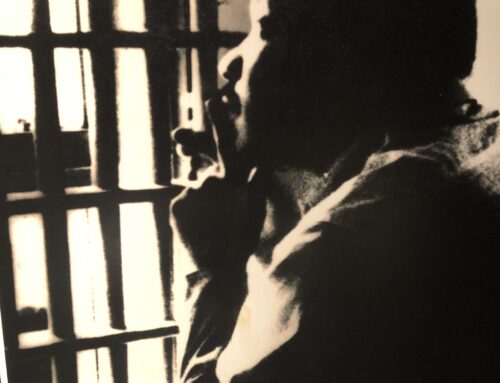The prophet Elijah had just defeated 450 prophets of Baal on Mt. Carmel. He called fire down from heaven that destroyed their altar, and then he took them down to the Wadi Kishon and killed them all. It was an overwhelming victory against gross evil. It was a dream-come-true for any prophet of God. But it seems that Elijah expected for that win to define him and his ministry, and to establish righteousness in the land. What he discovered, however, was that his great victory on the mountain introduced a whole new kind of battle.
Victories have a way of pulling the curtain back on the broken places of our heart. Victories expose our motivations and our insecurities. They test us in a way that struggles never do.
Problems are easy to see. We pray and work to overcome them and then look for results. But when God comes through and gives us the big win, His work in us is just beginning. We discover that the small faith inside of us is a much bigger problem than the enemy that once surrounded us.
When King Ahab’s wicked wife, Jezebel, heard the prophets of Baal were slain, she was furious. So she put a bounty on the prophet’s head. Elijah who had just called fire from heaven to destroy an army of false prophets began running for his life.
He did not run because God was incapable of protecting him. He did not run because he had lost the favor of God. He did not run because his assignment changed. Elijah was no spiritual lightweight. He was a man who walked with God in great power, but he ran because he believed at least five devastating lies that caused him to despair in the face of victory.
Lie #1: Opposition discredits us.
The people in power did not applaud Elijah’s great work on Mt. Carmel. Instead, his victory brought reproach and outright opposition from the most influential people in the country. And somehow in his mind, Elijah interpreted that opposition as an indictment on his personal worth and the work he was doing. Jezebel’s disapproval caused Elijah to despair of life!
Our obedience to God and the victory that He gives do not always result the approval of other people. Our spiritual progress does not always increase our influence. The apostle Paul wrote,
“Because a wide door for effective ministry has opened for me—yet many oppose me” (1 Corinthians 16:9).
Sometimes obedience results in opposition, but that opposition does not discredit our worth or our work. Instead, stiff opposition only confirms that our work is pushing back the forces of darkness in a way that is changing the scorecard.
Lie #2: Fear tells the whole truth.
Elijah was afraid, and his fear was real. Jezebel had the desire and ability to kill him. Death was a possibility for Elijah. Jezebel was certainly powerful, but she was not all-powerful.
During one particularly difficult season of life, I quoted to a friend King David’s words, “What can man do to me?” My friend did not want to discourage my faith in God, but he kindly reminded me that man could actually do harm to me.
Living on mission can be dangerous, but we often assume that whatever we fear will happen is all that could possibly happen. Our fear, as valid as it is, smothers our faith to the reality that God is at work in ways beyond the imminent threat. Fear never tells the whole truth. Our enemy is real and powerful, but God is more powerful.
Lie #3: When we feel abandoned by God, we are abandoned by God.
Elijah felt alone. He felt as if God was finished with him, but in his lonely place, God met with him. God reminded him that although he felt abandoned, he was not.
The illusion of isolation often causes us to actually isolate. We retreat. We feel lost, so we runaway. We feel abandoned, so we abandon our calling. We view our feelings as facts, and we take action accordingly. It is the wrong action, but we feel validated in it. We may even feel brave or assertive in our resolve to stubbornly despair of life. But God will not be deterred. We may spurn Him, we may forget Him, but He stays by our side.
Lie #4: No one else gets it.
When Elijah made it to Beer-sheba, he left his servant behind and walked another day into the wilderness. This man who was called to a public, nation-wide ministry now wanted to go it alone. He wanted to suffer alone. He even wanted to die alone.
Other people may not understand exactly what we are experiencing, but we are deceived to think no one else gets our pain or can handle our pain or can help us in our pain. Our experience is unique, but our suffering is not. We are not the exception. We are not beyond the help of the people closest to us. The people in our lives are not accessories; they are the provision of God when we are at our worst.
So resist the temptation to stiff-arm the people God has given to you. Instead, invite them to come closer. You may be surprised how God uses them to renew your hope and uses you to remind them of God’s grace.
Lie #5: The big break I need is out of reach.
Elijah was over his head. He looked at the odds, and the odds were not in his favor. He was just one man, and the most powerful king and queen in the land were on his tail. He thought he needed a big break that was out of his reach. So despair walked in and captured his heart.
But Elijah did not need a big break. He did not need an army of warriors. He did not need what he thought he needed. It was not that complicated. He just needed rest, food, and water, and God provided all of that.
We do not need a big break. We just need God. That sounds simplistic, but because God is near, nothing we need is out of reach.
The Finish
Somewhere along the way we were convinced that God’s calling for us is to do big things for Him. That may be the biggest lie of all. The transformation of our heart, not the accumulation of our wins, is the goal of God’s work. Our best finishes are the beginning of God’s greatest work in our lives.





